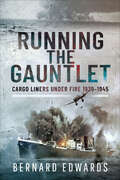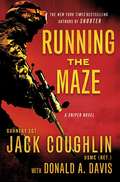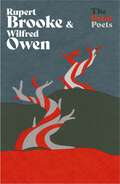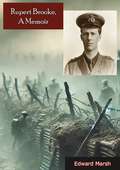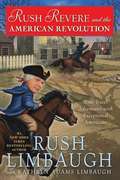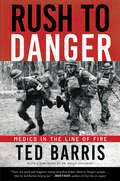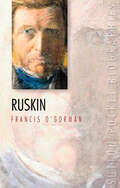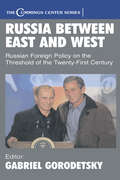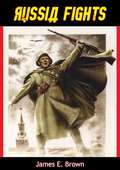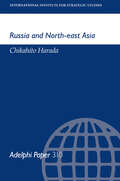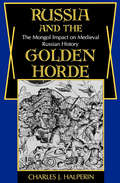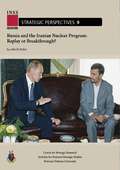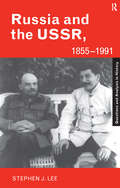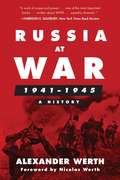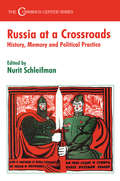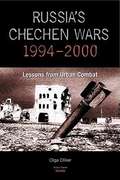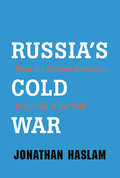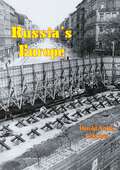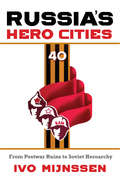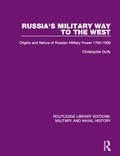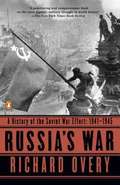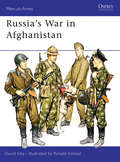- Table View
- List View
Running the Gauntlet: Cargo Liners Under Fire 1939–1945
by Bernard EdwardsThe British Merchant Navy dominated the world trade routes in the years leading up to the Second World War. The star players of the fleet were the cargo liners, faster and larger than the tramps and offering limited passenger accommodation. On the outbreak of war these cargo liners became crucial to the nation’s survival using their speed and expertise to evade Nazi warships, raiders and U-boats. Initially operating alone, but increasingly relying on Royal Navy protected convoys, these key elements of the Merchant Navy plied the oceans and seas despite mounting losses, throughout the war years. This superbly researched book describes numerous dramatic incidents. Some ended in disaster such as the New Zealand Shipping Company’s Turakina which was sunk after a running battle with the German raider Orion. Others were triumphs for example Operation Substance when six fast cargo liners succeeded against all the odds in reaching besieged Malta with vital supplies. The common denominations in all these historic voyages were the courage and skilled seamanship of the Merchant Navy crews. As Running The Gauntlet vividly illustrates, their contribution to victory, too long overlooked, cannot be overstated.
Running the Maze (Sniper Series #5)
by Jack Coughlin Donald A. DavisIn the latest high-intensity thriller in the New York Times bestselling sniper series, Marine Gunnery Sergeant Kyle Swanson is sent into Pakistan, where an international team of medical workers has been executed in order to cover up a deadly terrorist secret. In the aftermath of great floods, a doctor on a relief mission in northeastern Pakistan discovers the remains of a collapsed bridge that reminds him of a bridge near his childhood home in Ohio. He snaps a cell-phone picture and sends it to his sister, just before his entire team is slaughtered. His sister is Beth Ledford, a Coast Guard sniper, who suspects that the answer to the mystery of her brother's death is in that cell-phone picture. No one believes her until she finds Sergeant Kyle Swanson and the secret special operations team known as Task Force Trident. When Kyle takes Beth into Pakistan to investigate, they find the true secret behind the mass murder--what may be the last, best hope of victory by al Qaeda and the Taliban over allied forces. Now the two snipers have their sights set on one man, an American diplomat who has become the biggest obstacle to victory in the war on terror. The only question is: which of them gets to pull the trigger?
Rupert Brooke & Wilfred Owen: Heartbreakingly beautiful poems from the First World War poets (The Great Poets)
by Rupert Brooke Wilfred OwenIf I should die, think only this of me:That there's some corner of a foreign fieldThat is for ever England.From The Soldier to Anthem for Doomed Youth Rupert Brooke and Wilfred Owen are two of the best-loved poets from the heroic lost generation of the First World War. Brooke's work was well-known before the war, with the now iconic lines:'Stands the Church clock at ten to three?And is there honey still for tea?' from The Old Vicarage, Grantchester. And Wilfred Owen, awarded the Military Cross, had been writing poetry since he was ten years old.This superb collection is the perfect introduction to two of our greatest poets.
Rupert Brooke & Wilfred Owen: Heartbreakingly beautiful poems from the First World War poets (The Great Poets)
by Rupert Brooke Wilfred OwenIf I should die, think only this of me:That there's some corner of a foreign fieldThat is for ever England.From The Soldier to Anthem for Doomed Youth Rupert Brooke and Wilfred Owen are two of the best-loved poets from the heroic lost generation of the First World War. Brooke's work was well-known before the war, with the now iconic lines:'Stands the Church clock at ten to three?And is there honey still for tea?' from The Old Vicarage, Grantchester. And Wilfred Owen, awarded the Military Cross, had been writing poetry since he was ten years old.This superb collection is the perfect introduction to two of our greatest poets.
Rupert Brooke, a Memoir
by Edward MarshRupert Brooke: A Memoir by Edward Marsh offers an intimate and moving tribute to the life and legacy of the English poet Rupert Brooke, one of the most celebrated literary figures of the early 20th century. Written by Brooke’s close friend and literary executor, Marsh’s memoir provides a deeply personal portrait of the young poet, whose life was tragically cut short during World War I.Through a blend of biography, letters, poems, and personal recollections, Marsh captures Brooke’s vibrant personality, intellectual brilliance, and creative spirit. The memoir traces Brooke’s early life, his education at Rugby and Cambridge, and his rise to prominence as part of the Georgian Poets. Marsh reflects on Brooke’s personal struggles, including his bouts with depression and heartbreak, while also celebrating his charm, wit, and love of beauty.The memoir highlights Brooke’s travels, friendships with prominent literary and political figures of the time, and his evolving views on art, love, and life. Marsh also delves into Brooke’s fascination with idealism and his belief in the transformative power of poetry. The book provides insight into Brooke’s famous war sonnets—particularly The Soldier—which capture both the promise of youth and the tragic reality of war.Marsh’s portrayal of Brooke is both affectionate and honest, offering readers a nuanced glimpse into the poet’s complex inner world. The narrative culminates with Brooke’s service in World War I and his untimely death in 1915, cementing his legacy as a symbol of the lost generation.Rupert Brooke: A Memoir is more than a biography—it is a tribute to a gifted poet whose life embodied the hopes, ideals, and heartbreaks of his era. This book will appeal to those interested in poetry, literary history, and the cultural landscape of pre-war England, offering a tender and reflective account of one of the most enduring figures in English literature.
Rush Revere and the American Revolution: Time-Travel Adventures With Exceptional Americans (Rush Revere #3)
by Rush Limbaugh Kathryn Adams LimbaughThe American revolution has begun—and Rush Revere, Liberty the horse, and the time-traveling crew are ready to ride into the action!Join us on this incredible time-travel adventure! Liberty, my wisecracking horse, our old friends Cam, Tommy, Freedom, and I are off to meet some super-brave soldiers in the year 1775. Yep, that&’s right. We&’ll be visiting with the underdog heroes who fought for American independence, against all odds—and won! But not before eight very real years of danger and uncertainty. Be a part of Rush Revere&’s crew as we rush, rush, rush into a time when British rule had become a royal pain, and rebellion was in the air. We&’ll be on hand to see two lanterns hung in the Old North Church, prevent a British spy from capturing Paul Revere, and grapple with danger at the battles of Lexington, Concord, and Bunker Hill. The extra special part of this trip is that right here in the twenty-first century, Cam&’s dad is a soldier fighting in Afghanistan, and Cam has been pretty angry that he is away. Visiting with exceptional American heroes like Dr. Joseph Warren and George Washington, racing along after Paul Revere on his midnight ride, and seeing the Declaration of Independence signed make Cam see his own dad in a new and special way. But don&’t worry. Along with the danger, excitement, and patriotism, there will still be time to stop for a delicious spinach, oats, and alfalfa smoothie. No, wait—that one&’s for Liberty. The kids and I voted for strawberries. Now let&’s open the magic portal to the past!
Rush to Danger: Medics in the Line of Fire
by Ted BarrisNoted military historian Ted Barris once asked his father, Alex, “What did you do in the war?” What the former US Army medic then told his son forms the thrust of Barris’s latest historic journey—an exploration of his father’s wartime experiences as a medic leading up to the Battle of the Bulge in 1944–45, along with stories of other medics in combat throughout history. Barris’s research reveals that this bloodiest of WWII battles was shouldered largely by military medics. Like his father, Alex, medics in combat evacuated the wounded on foot, scrounged medical supplies where there were seemed to be none, and dodged snipers and booby traps on the most frigid and desolate battlefields of Europe. While retracing his father’s wartime experience, the author weaves into his narrative stories about the life-and-death struggles of military medical personnel during a century of service. In this unique front-line recounting of the experiences of stretcher bearers, medical corpsmen, nurses, surgeons, orderlies, dentists and ambulance drivers, Barris explores the evolution of battlefield medicine at such historic engagements as Fredericksburg, Batoche, the Ypres Salient, the Somme, Vimy, Singapore, Dieppe, Normandy, Falaise, Bastogne, Korea, Iraq and Afghanistan. Barris’s sources reveal—like never before—why men and women sporting the red cross on their helmets or sleeves didn’t flee to safety but chose instead to rush to assist.
Ruskin
by Francis O'GormanJohn Ruskin was one of the greatest Victorian critics of art and society, but he was also preoccupied with politics, economics and education. This pocket-sized biography explores his influence on his own age and ours, examining his work, his relationships and his creative life.
Russia Between East and West: Russian Foreign Policy on the Threshhold of the Twenty-First Century (Cummings Center Series)
by Gabriel GorodetskyGabriel Gorodetsky unravels President Putin's efforts to re-establish Russia's position as a major power, attempting to reconcile Russia's traditional national interests with the newly emerging social and political entity taking shape at home.
Russia Fights
by James E. Brown Joseph E. DaviesA fascinating look at the Russian war effort during World War Two by and American war correspondent on the spot in Moscow."It has been said that World War II will be the most completely recorded conflict in history. Hundreds of newspapermen are now with the armed forces on every front. Through the medium of press, radio, and newsreel, they are giving a full picture of what is happening on the battlefields. (Many war correspondents have given their lives in that service.) But, more than that, they are telling us of the nature of the war, its causes and implications, and it is because of this universal education that I think there is more hope than heretofore of avoiding future international human slaughter. Nothing will contribute more to understanding among nations, which is, of course, essential for peace. With this in mind, I would urge every American to read Jim Brown's Russia Fights.Russia Fights is not an ordinary war book. It is a fascinating and vivid picture of the Soviet Union by a veteran foreign correspondent. [...] [It] should do much to promote Soviet-American understanding. Jim Brown gives us a good picture of wartime Moscow, and, with an eye for relevant details, he also portrays the daily life and feeling of the people."
Russia and North-East Asia (Adelphi series)
by Chikahito HaradaRussia has recently strengthened its diplomatic relations with its North-East Asian neighbours - China, Japan, and North and South Korea. But without much more reform at home, Russia will be neither attractive as a partner nor live up to its full potential. Chikahito Harada assesses the reasons for Russia's policy towards North East Asia and offers key policy recommendations.
Russia and the Golden Horde: The Mongol Impact on Medieval Russian History (Encounters: Explorations in Folklore and Ethnomusicology)
by Charles J. HalperinThis revelatory study of Russian medieval history and the age of Mongolian conquest &“infuses the subject with fresh insights and interpretations&” (History). In the 13th century, a Mongolian confederation known as The Golden Horde dominated a vast region including Russia, Ukraine, Kazakhstan, and the Caucuses. Though it would hold power into the 15th century, the influence of the Mongolian Empire on Russian history and culture has been all but ignored. Only in recent years have historians, archeologists, and philologists started to shed much needed light on this significant period of Mongol rule. In this enlightening new study, historian Charles Halperin assesses these recent findings to provide a comprehensive view of this chapter in Russian medieval history, offering a new interpretation of what role the Mongols played in the story of Russia. A Selection of the History Book Club&“Combining rigorous analysis of the major scholarly findings with his own research, Halperin has produced both a much-needed synthesis and an important original work." –Library Journal
Russia and the Iranian Nuclear Program: Replay or Breakthrough?
by John W. ParkerWhile coordinating more closely with Washington on Iran during the Medvedev administration, Moscow did not and has not closed the door to engagement with Tehran. In 2010, Russia voted for new, enhanced sanctions against Iran at the United Nations Security Council (UNSC). Nevertheless, Moscow and Tehran have remained engaged diplomatically, and their relations have stabilized and begun to recover from their winter 2010-2011 low point.At the same time, Russia continues to insist that Iran comply with its commitments under the Nuclear Non-Proliferation Treaty (NPT) and cooperate fully with International Atomic Energy Agency (IAEA) inspectors. However, Russia is wary of pushing so hard on compliance lest Iran entirely abandon its treaty obligations and walk out of the NPT.In February 2011, Moscow began to oppose another round of UNSC sanctions, and in July 2011 put forward a “step-by-step” initiative coordinated with other Permanent Members of the Security Council and Germany (the so-called P5+1). The Moscow approach offered Tehran a gradual reduction in sanctions in return for improved cooperation with the IAEA in monitoring Iran’s nuclear enrichment program.Putin’s resentment of U.S. power and suspicion of American motives will make for frostier atmospherics between Moscow and Washington. Nonetheless, mistrust of Iran will continue to outweigh Putin’s misgivings about the United States. Everything else being equal, the United States will always be more important to Russia than Iran.Most Russian experts now believe that Iran is advancing toward a military nuclear weapons program—though it has not made a final decision to go all the way—and a ballistic missile program to accompany it. Russia sees these programs as a threat to its interests.
Russia and the USSR, 1855–1991: Autocracy and Dictatorship (Questions and Analysis in History)
by Stephen J. LeeFrom a renowned name in A Level history publishing, this is a Questions and Analysis title on a major period in Russian History. With all three exam boards offering modules on this popular subject at A Level, this book is an absolute must-have. Looking at the many different aspects of the period 1855–1991 that are covered in A Level history, Stephen J. Lee examines and compares: the ideologies of Tsarist autocracy and Soviet communism parties and opposition to these regimes the use of repression and terror agriculture industry the class structure the 1917 revolution the impact of the First and Second World Wars on Russia. Key elements of this book include: each topic/issue forms a well-structured chapter: background; analysis; sources with questions; worked answers a prominent historiography section – an important element of the new A2 history assessment an incorporated A2 synoptic approach that teaches students to draw together their entire range of knowledge and skills to study one topic guidance on how to answer the recently-introduced synoptic questions. Involving the importance of understanding the connections between the essential characteristics of historical study, this key title is the one-stop shop for all history teachers and students.
Russia at War, 1941–1945: A History
by Nicolas Werth Alexander WerthIn 1941, Russian-born British journalist Alexander Werth observed the unfolding of the Soviet-German conflict with his own eyes. What followed was the widely acclaimed book, Russia at War, first printed in 1964. At once a history of facts, a collection of interviews, and a document of the human condition, Russia at War is a stunning, modern classic that chronicles the savagery and struggles on Russian soil during the most incredible military conflict in modern history.As a behind-the-scenes eyewitness to the pivotal, shattering events as they occurred, Werth chronicles with vivid detail the hardships of everyday citizens, massive military operations, and the political movements toward diplomacy as the world tried to reckon with what they had created. Despite its sheer historical scope, Werth tells the story of a country at war in startlingly human terms, drawing from his daily interviews and conversations with generals, soldiers, peasants, and other working class civilians. The result is a unique and expansive work with immeasurable breadth and depth, built on lucid and engaging prose, that captures every aspect of a terrible moment in human history.Now newly updated with a foreword by Soviet historian Nicolas Werth, the son of Alexander Werth, this new edition of Russia at War continues to be indispensable World War II journalism and the definitive historical authority on the Soviet-German war.
Russia at a Crossroads: History, Memory and Political Practice (Cummings Center Series #Vol. 8)
by Nurit SchleifmanThe meaning of Russia's past is in a process of continuous deconstruction, reshaping and negotiation by various social and political groupings. Of the deluge of group memories which have broken loose, this collection focuses on several new voices which have never been heard in Russia in this way before: women, Tatars, Cossacks, as well as the voices of religious and provincial populations. In addition, the volume sheds light on the creation of a multi-party system which paved the way for the expression of particular views and interests and generated much of memory's concepts and language.
Russia's Chechen Wars 1994-2000: Lessons from Urban Combat
by Olga OlikerAn examination of the difficulties faced by the Russian military in planning and carrying out urban operations in Chechnya. Russian and rebel military forces fought to control the Chechen city of Grozny in the winters of 1994-1995 and 1999-2000, as well as clashing in smaller towns and villages. The author examines both Russian and rebel tactics and operations in those battles, focusing on how and why the combatants' approaches changed over time. The study concludes that while the Russian military was able to significantly improve its ability to carryout a number of key tasks in the five-year interval between the wars, other important missions--particularly in the urban realm--were ignored, largely in the belief that the urban mission could be avoided. This conscious decision not to prepare for a most stressful battlefield met with devastating results, a lesson the United States would be well served to study.
Russia's Cold War: From the October Revolution to the Fall of the Wall
by Jonathan HaslamThe phrase "Cold War" was coined by George Orwell in 1945 to describe the impact of the atomic bomb on world politics: "We may be heading not for a general breakdown but for an epoch as horribly stable as the slave empires of antiquity." The Soviet Union, he wrote, was "at once unconquerable and in a permanent state of 'cold war' with its neighbors." But as a leading historian of Soviet foreign policy, Jonathan Haslam, makes clear in this groundbreaking book, the epoch was anything but stable, with constant wars, near-wars, and political upheavals on both sides. Whereas the Western perspective on the Cold War has been well documented by journalists and historians, the Soviet side has remained for the most part shrouded in secrecy--until now. Drawing on a vast range of recently released archives in the United States, the United Kingdom, France, Germany, Russia, and Eastern Europe, Russia's Cold War offers a thorough and fascinating analysis of East-West relations from 1917 to 1989. Far more than merely a straightforward history of the Cold War, this book presents the first account of politics and decision making at the highest levels of Soviet power: how Soviet leaders saw political and military events, what they were trying to accomplish, their miscalculations, and the ways they took advantage of Western ignorance. Russia's Cold War fills a significant gap in our understanding of the most important geopolitical rivalry of the twentieth century.
Russia's Europe
by Harold Arthur LehrmanA startling record of a liberal Journalist’s adventure and change of heart behind the Balkan Curtain—the first full inside story of the Soviet peace-time march of empire and its meaning to us.“In early 1945, when the project was only a gleam in the eye of author and publisher, the working title was Reporter in Search of Peace. Peace did not mean simply armistice, a mere end to the shooting. Everybody somehow knew the war was nearly over, even though one’s troopship was blacked out and its destroyer escort scared away a brace of U-boats just off the Virginia coast. My credentials still read “war correspondent,” and a flattering uniform came with the title, but “peace correspondent” and an old suit would have fitted the program better, because I was going to watch how the peace was being made—not the paper treaties, but the real peace, the one that had to endure. The core of the book would be a parallel between the end of World War I and the end of World War II. The mistakes of 1919 and of the two decades between the wars were legible signposts indicating the wrong direction. I was to try and see which way the victors were heading this time…The reader will find no sensational interviews with famous men, nor many conversations with the present rulers of Southeastern Europe. One of the characteristics of the New Order, in fact, is the distaste of its leaders for the press, and their fear of saying anything at all before clearing it through the highest authority. I have spent much more time with the little people, what they had to tell me, and how they felt—all of which took me much closer to the truth...All I can report is a political war, the creeping conquest of many peoples by an army carrying placards and posters instead of flags. All I can report is the silent battle of half a continent, in resistance to a future not of its own choosing.”
Russia's Hero Cities: From Postwar Ruins to the Soviet Heroarchy
by Ivo MijnssenWorld War II, known as the Great Patriotic War to Russians, ravaged the Soviet Union and traumatized those who survived. After the war, memory of this anguish was often publicly repressed under Stalin. But that all changed by the 1960s. Under Brezhnev, the idea of the Great Patriotic War was transformed into one of victory and celebration. In Russia's Hero Cities, Ivo Mijnssen reveals how contradictory national recollections were revised into an idealized past that both served official needs and offered a narrative of heroism. This triumphant narrative was most evident in the creation of 13 Hero Cities, now located across Russia, Belarus, and Ukraine. These cities, which were host to some of the fiercest and most famous battles, were named champions. Brezhnev's government officially recognized these cities with awards, financial contributions, and ritualized festivities. Their citizens also encountered the altered history at every corner—on manicured battlefields, in war memorials, and through stories at the kitchen table. Using a rich tapestry of archival material, oral history interviews, and newspaper articles, Mijnssen provides a thorough exploration of two cities in particular, Tula and Novorossiysk. By exploring the significance of Hero Cities in Soviet identity and the enduring but conflicted importance they hold for Russians today, Russia's Hero Cities exposes how the Great Patriotic War no longer has the power to mask the deep rifts still present in Russian society.
Russia's Military Way to the West: Origins and Nature of Russian Military Power 1700-1800 (Routledge Library Editions: Military and Naval History)
by Christopher DuffyThis book provides an historical perspective on the growth of Russian military power, studying the emergence of the Russian regular army from 1700 until the end of the eighteenth century. In the process he evaluates the relative importance of Western and native influences on the creation of this formidable military machine, and indicates the ways in which Russian power was projected in the West. The book includes general discussions of the Russian soldier, the Russian officer and the rapacious Cossacks, and concludes by identifying certain important continuities between the Russian past and present.
Russia's War
by Richard OveryIn Russia's War: 1941-1945, Richard Overy re-creates the Soviet Union's apocalyptic struggle against Nazi Germany, from the point of view both of the troops and of the ordinary civilians. In the course of human history there has probably been no more terrible place than Eastern Europe in 1941-45. Estimates of total Soviet military and civilian deaths in the period now stand at more than 25 million. Yet without the Soviet war effort, it is unlikely that Germany could have ever been defeated. Drawing on a recent wealth of evidence to account for the Soviet Union's remarkable victory against invading forces, Richard Overy's Russia's War is a fascinating account of the epic struggle that turned the tide of the Second World War. 'Masterly . . . a vivid account' Robert Service, Independent 'A dramatic and exciting tale . . . His set-piece descriptions of such visions of Hell as Stalingrad, the 900-day siege of Leningrad and the crucial battle of Kursk are as fascinating as they are horrifying' Alan Judd, Sunday Times 'Overy is a first-class military historian . . . Now, we have an authoritative British account that understands both sides, without illusions' Norman Stone, Spectator 'Excellent . . . Overy tackles this huge, complex and multifaceted story with the vital gifts of clarity and brevity' Antony Beevor, Literary Review Richard Overy is Professor of History at the University of Exeter. His books include Why the Allies Won, Russia's War, The Battle of Britain, The Morbid Age and The Dictators, which won the Wolfson and the Hessell Tiltman Prizes for history in 2005.
Russia's War
by Richard OveryMore information to be announced soon on this forthcoming title from Penguin USA.
Russia's War in Afghanistan
by Ronald Volstad David IsbyText by David Isby. Colour plates by Ron Volstad. This book examines Soviet forces in Afghanistan. The origins and conduct of the war and the operational organisation of Soviet forces are discussed. Afghan resistance and weaponry is also examined. A comprehensive study of both sides in the Afghan war.
Russia's War: 1941-1945
by Richard Overy"A penetrating and compassionate book on the most gigantic military struggle in world history."--The New York Times Book Review"An extraordinary tale... Overy's engrossing book provides extensive details of teh slaughter, brutality, bitterness and destruction on the massive front from the White Sea to the flank of Asia."--Chicago Tribune The Russian war effort to defeat invading Axis powers, an effort that assembled the largest military force in recorded history and that cost the lives of more than 25 million Soviet soldiers and civilians, was the decisive factor for securing an Allied victory. Now with access to the wealth of film archives and interview material from Russia used to produce the ten-hour television documentary Russia's War, Richard Overy tackles the many persuasive questions surrounding this conflict. Was Stalin a military genius? Was the defense of Mother Russia a product of something greater than numbers of tanks and planes--of something deep within the Russian soul?
